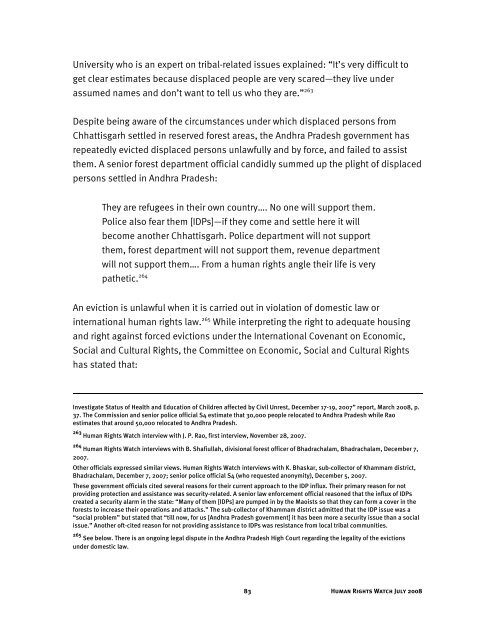âBeing Neutral is Our Biggest Crimeâ - Global Coalition to Protect ...
âBeing Neutral is Our Biggest Crimeâ - Global Coalition to Protect ...
âBeing Neutral is Our Biggest Crimeâ - Global Coalition to Protect ...
Create successful ePaper yourself
Turn your PDF publications into a flip-book with our unique Google optimized e-Paper software.
University who <strong>is</strong> an expert on tribal-related <strong>is</strong>sues explained: “It’s very difficult <strong>to</strong><br />
get clear estimates because d<strong>is</strong>placed people are very scared—they live under<br />
assumed names and don’t want <strong>to</strong> tell us who they are.” 263<br />
Despite being aware of the circumstances under which d<strong>is</strong>placed persons from<br />
Chhatt<strong>is</strong>garh settled in reserved forest areas, the Andhra Pradesh government has<br />
repeatedly evicted d<strong>is</strong>placed persons unlawfully and by force, and failed <strong>to</strong> ass<strong>is</strong>t<br />
them. A senior forest department official candidly summed up the plight of d<strong>is</strong>placed<br />
persons settled in Andhra Pradesh:<br />
They are refugees in their own country…. No one will support them.<br />
Police also fear them [IDPs]—if they come and settle here it will<br />
become another Chhatt<strong>is</strong>garh. Police department will not support<br />
them, forest department will not support them, revenue department<br />
will not support them…. From a human rights angle their life <strong>is</strong> very<br />
pathetic. 264<br />
An eviction <strong>is</strong> unlawful when it <strong>is</strong> carried out in violation of domestic law or<br />
international human rights law. 265 While interpreting the right <strong>to</strong> adequate housing<br />
and right against forced evictions under the International Covenant on Economic,<br />
Social and Cultural Rights, the Committee on Economic, Social and Cultural Rights<br />
has stated that:<br />
Investigate Status of Health and Education of Children affected by Civil Unrest, December 17-19, 2007” report, March 2008, p.<br />
37. The Comm<strong>is</strong>sion and senior police official S4 estimate that 30,000 people relocated <strong>to</strong> Andhra Pradesh while Rao<br />
estimates that around 50,000 relocated <strong>to</strong> Andhra Pradesh.<br />
263 Human Rights Watch interview with J. P. Rao, first interview, November 28, 2007.<br />
264 Human Rights Watch interviews with B. Shafiullah, div<strong>is</strong>ional forest officer of Bhadrachalam, Bhadrachalam, December 7,<br />
2007.<br />
Other officials expressed similar views. Human Rights Watch interviews with K. Bhaskar, sub-collec<strong>to</strong>r of Khammam d<strong>is</strong>trict,<br />
Bhadrachalam, December 7, 2007; senior police official S4 (who requested anonymity), December 5, 2007.<br />
These government officials cited several reasons for their current approach <strong>to</strong> the IDP influx. Their primary reason for not<br />
providing protection and ass<strong>is</strong>tance was security-related. A senior law enforcement official reasoned that the influx of IDPs<br />
created a security alarm in the state: “Many of them [IDPs] are pumped in by the Mao<strong>is</strong>ts so that they can form a cover in the<br />
forests <strong>to</strong> increase their operations and attacks.” The sub-collec<strong>to</strong>r of Khammam d<strong>is</strong>trict admitted that the IDP <strong>is</strong>sue was a<br />
“social problem” but stated that “till now, for us [Andhra Pradesh government] it has been more a security <strong>is</strong>sue than a social<br />
<strong>is</strong>sue.” Another oft-cited reason for not providing ass<strong>is</strong>tance <strong>to</strong> IDPs was res<strong>is</strong>tance from local tribal communities.<br />
265 See below. There <strong>is</strong> an ongoing legal d<strong>is</strong>pute in the Andhra Pradesh High Court regarding the legality of the evictions<br />
under domestic law.<br />
83<br />
Human Rights Watch July 2008
















